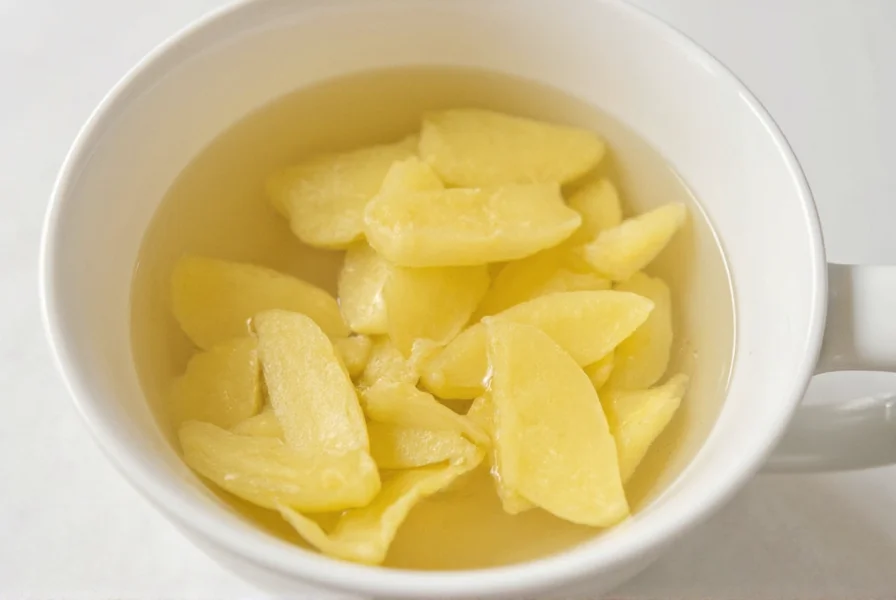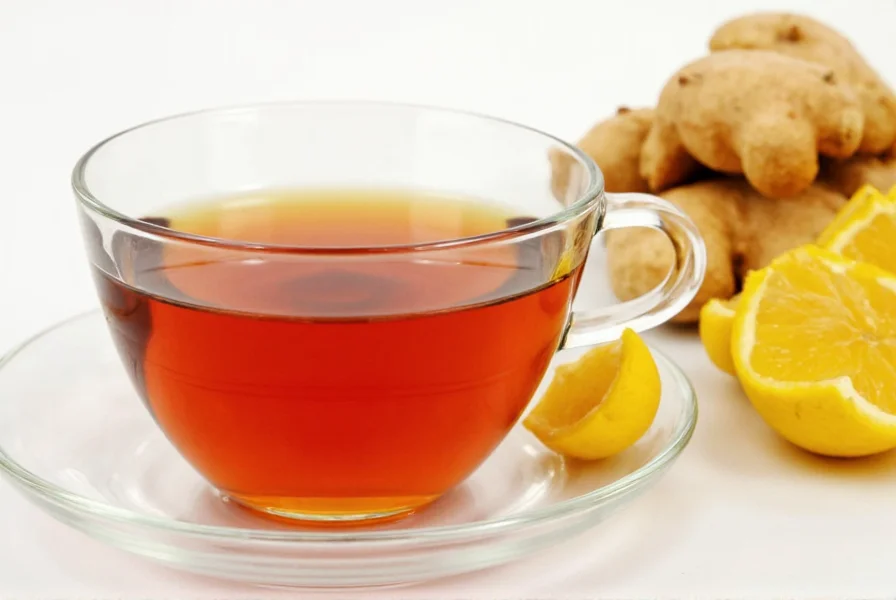For many experiencing occasional heartburn, natural remedies like ginger tea offer an appealing alternative to over-the-counter medications. This comprehensive analysis examines the relationship between ginger tea consumption and acid reflux symptoms based on current scientific understanding.
Understanding Acid Reflux and Ginger's Potential Role
Acid reflux occurs when stomach contents flow back into the esophagus, causing that familiar burning sensation known as heartburn. The lower esophageal sphincter (LES), a muscular valve between the esophagus and stomach, normally prevents this backward flow. When this valve weakens or relaxes inappropriately, reflux occurs.
Ginger (Zingiber officinale) contains bioactive compounds like gingerols and shogaols that may influence digestive processes. Research suggests ginger might help with acid reflux through several potential mechanisms:
- Accelerating gastric emptying - Some studies indicate ginger may speed up stomach emptying, reducing the time food and acid remain in the stomach
- Anti-inflammatory effects - Ginger's compounds may reduce inflammation in the digestive tract
- LES modulation - Preliminary research suggests ginger might help strengthen LES function
- Nausea reduction - Ginger's well-documented anti-nausea properties may provide secondary relief

What Scientific Research Reveals
A 2021 systematic review published in the Journal of Gastroenterology and Hepatology examined multiple studies on ginger and digestive health. The analysis found moderate evidence supporting ginger's effectiveness for nausea and vomiting, but limited high-quality evidence specifically for acid reflux treatment.
One notable study from 2019 involving 150 participants with mild GERD (gastroesophageal reflux disease) showed that those who consumed ginger extract experienced a 25% reduction in symptom frequency compared to placebo after four weeks. However, the study had limitations including small sample size and short duration.
| Research Study | Participants | Findings on Acid Reflux | Limitations |
|---|---|---|---|
| 2019 GERD Study | 150 with mild GERD | 25% symptom reduction with ginger extract | Small sample, short duration |
| 2018 Digestive Health Review | Multiple studies analyzed | Moderate evidence for nausea, limited for reflux | Heterogeneous study designs |
| 2020 Case Series | 22 patients | Worsened symptoms in 36% of participants | No control group, observational |
When Ginger Tea Might Help (and When It Might Not)
Certain factors determine whether ginger tea could be beneficial for your acid reflux:
Situations where ginger tea may provide relief:
- Mild, occasional heartburn episodes
- Reflux triggered by slow gastric emptying
- Individuals without ginger sensitivity
- As a complement to other lifestyle modifications
Circumstances where ginger tea might worsen symptoms:
- Consuming large quantities (more than 4 grams of ginger daily)
- Drinking close to bedtime (may relax LES)
- Individuals with bile reflux (ginger may stimulate bile production)
- Those with ginger sensitivity or allergies

Preparing Ginger Tea for Acid Reflux Relief
If you decide to try ginger tea for acid reflux, proper preparation matters. Here's how to maximize potential benefits while minimizing risks:
- Use fresh ginger root - Peel and slice 1-2 inches of fresh ginger (about 1-2 grams)
- Steep properly - Pour 8-12 ounces of hot (not boiling) water over ginger slices
- Limit steeping time - 5-10 minutes is sufficient; longer steeping extracts more potent compounds that might irritate
- Avoid additives - Skip honey, lemon, or other potential triggers initially
- Timing matters - Consume 30-60 minutes after meals, not before bedtime
Start with a single cup daily and monitor your symptoms. If you experience worsening symptoms, discontinue use immediately. Remember that ginger tea for occasional heartburn relief differs significantly from managing chronic GERD, which requires medical supervision.
Ginger Tea Compared to Other Natural Remedies
Many natural remedies claim to help with acid reflux. How does ginger tea stack up against alternatives?
- Aloe vera juice - May soothe irritated esophageal tissue but lacks strong evidence for reflux specifically
- Slippery elm - Forms a protective coating but limited research on effectiveness for acid reflux
- Chamomile tea - Calming properties may help with stress-related reflux but minimal direct impact on stomach acid
- Apple cider vinegar - Controversial approach with limited evidence and potential to worsen symptoms
Unlike some remedies that work by neutralizing stomach acid (which can disrupt normal digestion), ginger appears to work through multiple mechanisms that support natural digestive function without altering stomach pH significantly.
Important Safety Considerations
While generally recognized as safe, ginger tea isn't appropriate for everyone with acid reflux:
- Ginger may interact with blood thinners like warfarin
- Pregnant women should consult their healthcare provider before regular consumption
- Those with gallstone disease should exercise caution as ginger may stimulate bile production
- Diabetics should monitor blood sugar as ginger may enhance insulin sensitivity
- Stop using ginger tea if you experience increased heartburn, mouth irritation, or other adverse effects
For individuals with chronic GERD (occurring more than twice weekly), ginger tea should never replace prescribed medications or medical advice. Chronic acid exposure can cause serious complications including esophagitis, Barrett's esophagus, and increased cancer risk.
When to Seek Medical Attention
Natural remedies like ginger tea work best for occasional, mild heartburn. Consult a healthcare provider if you experience:
- Heartburn more than twice weekly
- Difficulty swallowing
- Unintended weight loss
- Nighttime symptoms that disrupt sleep
- Symptoms persisting despite lifestyle changes and over-the-counter treatments
These could indicate gastroesophageal reflux disease (GERD) or other serious conditions requiring medical intervention rather than home remedies.
Practical Tips for Managing Acid Reflux
For best results, incorporate ginger tea as part of a comprehensive approach to managing acid reflux:
- Elevate the head of your bed 6-8 inches to prevent nighttime reflux
- Avoid eating within 3 hours of bedtime
- Identify and eliminate personal trigger foods (common triggers include caffeine, chocolate, fatty foods, and citrus)
- Maintain a healthy weight
- Quit smoking if applicable
- Consider smaller, more frequent meals instead of large portions
Remember that individual responses to ginger tea for acid reflux relief vary significantly. What works for one person might not work for another, and some may find their symptoms worsen with ginger consumption.
Conclusion
Ginger tea shows promise as a potential complementary approach for managing mild, occasional acid reflux symptoms, though scientific evidence remains limited. Its potential benefits stem from anti-inflammatory properties and possible effects on gastric motility rather than neutralizing stomach acid. As with any natural remedy, individual responses vary, and ginger tea may actually worsen symptoms for some people.
For occasional heartburn, ginger tea prepared properly and consumed at appropriate times may provide relief without the side effects of some medications. However, it should never replace medical treatment for chronic GERD or severe symptoms. Always consult with a healthcare provider before making significant changes to your acid reflux management plan, especially if you have underlying health conditions or take medications.
Does ginger tea help with acid reflux immediately?
Ginger tea typically doesn't provide immediate relief for acute acid reflux episodes. Its potential benefits are more preventive and cumulative, possibly reducing frequency and severity of symptoms over time with regular use. For immediate relief during a heartburn episode, ginger tea may not be effective and could potentially worsen symptoms for some individuals.
How much ginger tea should I drink for acid reflux?
Start with one cup of ginger tea daily, prepared with 1-2 grams of fresh ginger (about a 1-inch slice). Steep for 5-10 minutes in hot (not boiling) water. If well-tolerated after a week, you might gradually increase to two cups daily, but never exceed 4 grams of ginger total per day. Always consume ginger tea 30-60 minutes after meals, not before bedtime.
Can ginger tea make acid reflux worse?
Yes, ginger tea can worsen acid reflux symptoms for some people. Approximately 36% of individuals in a 2020 case series experienced increased symptoms. Ginger may relax the lower esophageal sphincter in some people, stimulate bile production (problematic for bile reflux), or simply irritate sensitive esophageal tissue. If you notice worsening symptoms after drinking ginger tea, discontinue use immediately.
Is fresh ginger better than ginger tea bags for acid reflux?
Fresh ginger generally provides more consistent results for acid reflux management than pre-packaged tea bags. Fresh ginger allows you to control the strength and quantity, while commercial tea bags often contain variable amounts of ginger along with other ingredients that might trigger reflux. For best results, use 1-2 inches of peeled, sliced fresh ginger root steeped in hot water for 5-10 minutes.
How long does it take for ginger tea to work for acid reflux?
If ginger tea will help your acid reflux, you may notice subtle improvements within 1-2 weeks of consistent, proper use. However, significant symptom reduction typically takes 3-4 weeks. Keep a symptom journal to track your response. Remember that ginger tea works preventatively rather than providing immediate relief, and individual responses vary considerably—some people see no benefit or experience worsened symptoms.











 浙公网安备
33010002000092号
浙公网安备
33010002000092号 浙B2-20120091-4
浙B2-20120091-4